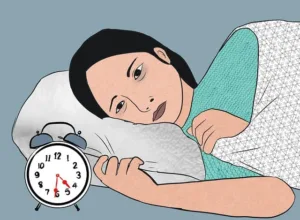It’s 3am and you’re still staring at the ceiling, wide awake. You try counting sheep, drinking chamomile tea, and reading until your eyes feel heavy but nothing seems to work. You check the time on your phone for what feels like the hundredth time and groan when you see that it’s only been 30 minutes since you last checked. You’re exhausted, but sleep seems impossible.
If this sounds familiar, you’re not alone. Sleep deprivation is a common problem, especially in developed countries where long work hours and busy lifestyles leave little time for rest.
While an occasional sleepless night isn’t cause for concern, chronic sleep deprivation can have serious consequences. It can lead to weight gain, depression, anxiety, and a host of other physical and mental health problems.
Sleep deprivation occurs when you don’t get enough sleep or when you have poor-quality sleep. It can be caused by a variety of factors, including work demands, stress, jet lag, and sleep disorders.
The effects of sleep deprivation are wide-ranging and can have a significant impact on your health, well-being, and quality of life. Here are some of the ways sleep deprivation can negatively affect you:
1. It Can Affect Your Physical Health
Sleep deprivation can take a toll on your physical health. It can lead to fatigue, headaches, and a weakened immune system. It can also increase your risk of accidents and injuries.
2. It Can Affect Your Mental Health
Sleep deprivation can also have a negative impact on your mental health. It can cause anxiety, depression, and irritability. It can also impair your judgement and decision-making skills.
3. It Can Affect Your Work Performance
Sleep deprivation can negatively impact your work performance. It can lead to errors, accidents, and absenteeism. It can also decrease your productivity and creativity.
4. It Can Affect Your Relationships
Sleep deprivation can also affect your personal relationships. It can make you more irritable and less patient. It can also lead to conflict and arguments.
5. It Can Affect Your Quality of Life
Sleep deprivation can have a significant impact on your overall quality of life. It can make you feel tired, stressed, and unhappy. It can also lead to absenteeism from work or school and social isolation.
If you’re struggling with sleep deprivation, there are things you can do to improve your sleep. Try to establish a regular sleep schedule. Avoid caffeine and alcohol before bed. Create a relaxing bedtime routine. And make sure your bedroom is dark, quiet, and comfortable.
If you’re still having trouble sleeping, talk to your doctor. They can help you identify the underlying cause of your sleep problems and recommend treatment options.









